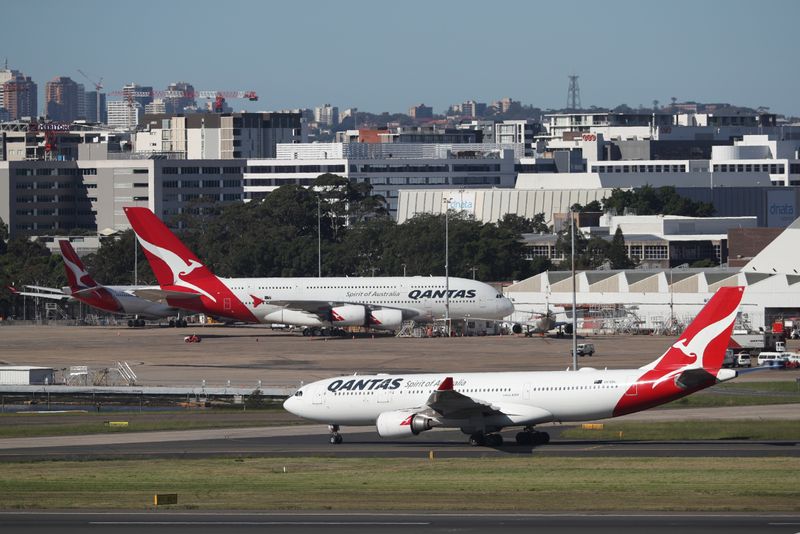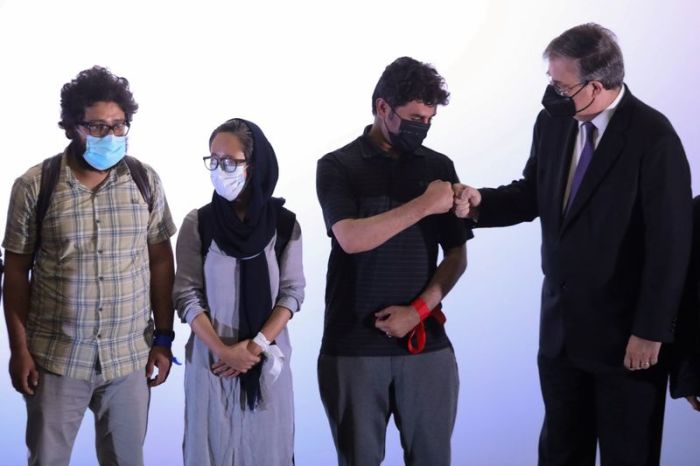SYDNEY (Reuters) -Qantas Airways Ltd on Thursday said it was preparing for international travel with countries with high vaccine rates to resume in December, sending shares higher, as it reported a narrower annual loss of A$1.73 billion ($1.26 billion).
The airline, which grounded its international fleet in March 2020 due to closed borders, said it planned to bring back five of its 12 Airbus SE A380 super-jumbos from mid-2022 to fly to the United States and Britain, a year earlier than previously forecast.
It is a hopeful sign for travel in the Asia-Pacific region, where borders are largely closed and international travel is 95% below pre-COVID levels, though the Qantas plan is dependent on government decisions and could be delayed. Shares rose as much as 3.7% to the highest levels since April.
Australia set a target last month for 80% of adults to be fully vaccinated for a calibrated reopening of its international borders.
At present, more than half the population is locked down due to COVID-19 outbreaks and just over 30% are fully vaccinated, though forecasts say the country could reach 80% by the end of the year as more doses of imported vaccines arrive.
Pending government decisions, Qantas said it expected flights to countries with high vaccine rates like Singapore, Japan, the United States, Britain and hopefully New Zealand to resume from mid-December.
Flights to places with lower vaccination rates like Indonesia, the Philippines, Thailand and South Africa would restart from April 2022 at the earliest, it added.
“One of the biggest unknowns is the quarantine requirements for fully vaccinated travellers entering Australia,” Qantas Chief Executive Alan Joyce said. “If it’s 14 days in a hotel, demand levels will be very low. A shorter period with additional testing and the option to isolate at home will see a lot more people travel.”
The airline forecasts international capacity will reach 30% to 40% of pre-COVID levels in the third quarter and 50% to 70% in the fourth quarter.
It will not revisit an order for up to 12 Airbus SE A350 planes capable of non-stop Sydney to London flights until borders reopen, Joyce told analysts, adding the earliest the flights could start would be 2024 or 2025.
The company will also retire two A380s and has pushed back delivery of three Boeing Co 787-9s and two A321neos by a year.
Qantas reported underlying earnings before interest, tax, depreciation and amortisation (EBITDA) of A$410 million for the 12 months ended June 30, in line with the average figure expected by 11 analysts polled by Refinitiv.
“Overall, with vaccination rates continuing to increase, the outlook beyond FY22 remains positive for Qantas, which remains a key COVID recovery stock,” Jefferies analyst Anthony Moulder told clients.
The statutory loss of A$1.73 billion, including impairments and restructuring charges, was better than last year’s A$1.96 billion loss.
The airline reported A$3.8 billion of liquidity as of June 30, down A$200 million from April 30.
The domestic market had performed strongly in the fourth quarter when state borders, often closed at times of small COVID-19 outbreaks, had been largely open.
But the country’s most populous city, Sydney, has been in lockdown since the end of June and the airline this month said it was temporarily idling about 2,500 employees without pay for at least two months as it cut capacity due to lower demand.
Qantas said recent outbreaks and the suspension of a travel bubble with New Zealand were expected to lower the company’s underlying EBITDA by around A$1.4 billion in the first half.
Domestic capacity is expected to rise to 53% of pre-COVID levels in the second quarter and then to around 110% of pre-COVID levels in the second half.
($1 = 1.3744 Australian dollars)
(Reporting by Jamie Freed;Editing by Neil Fullick, Stephen Coates and Gerry Doyle)























